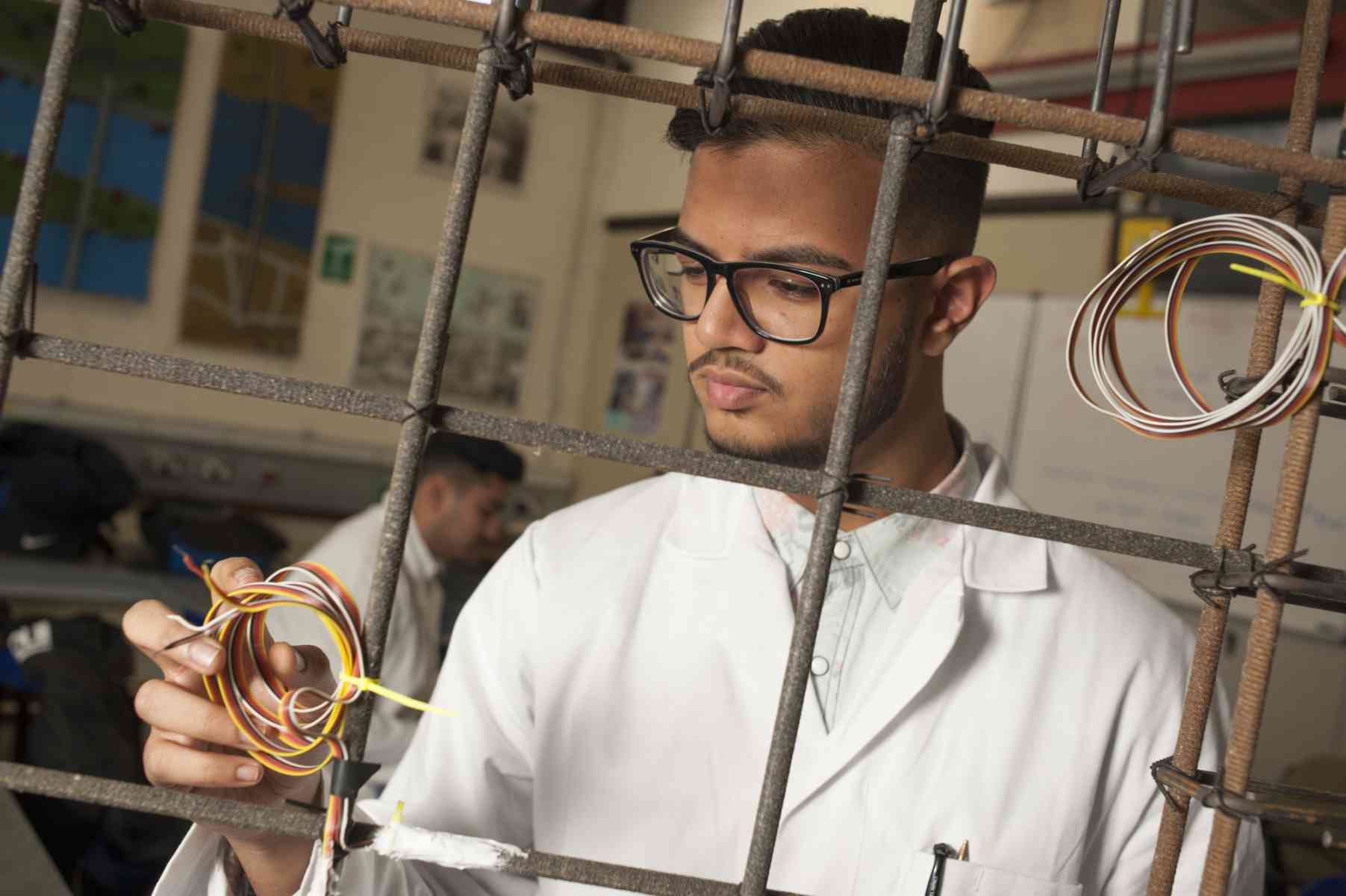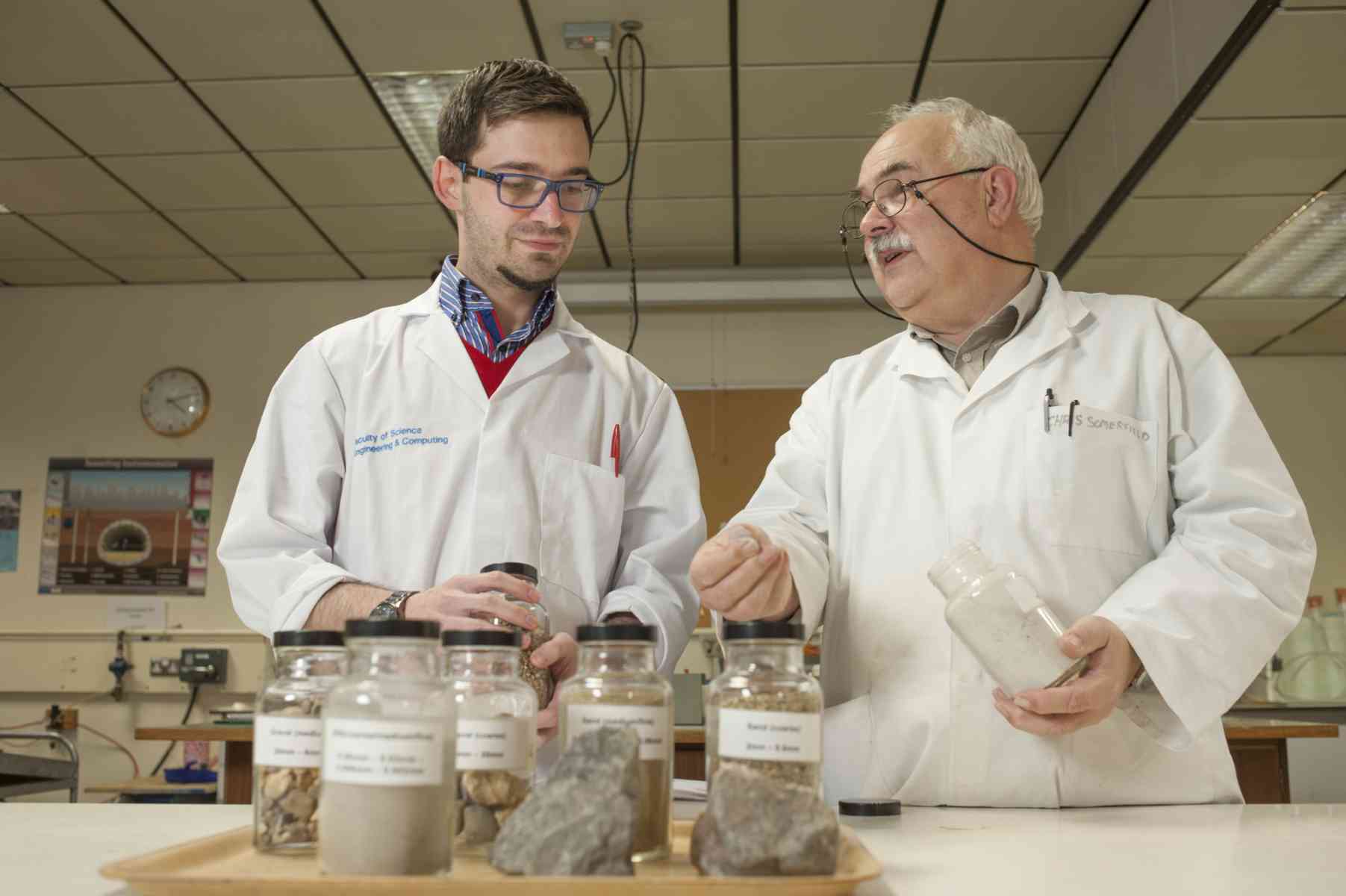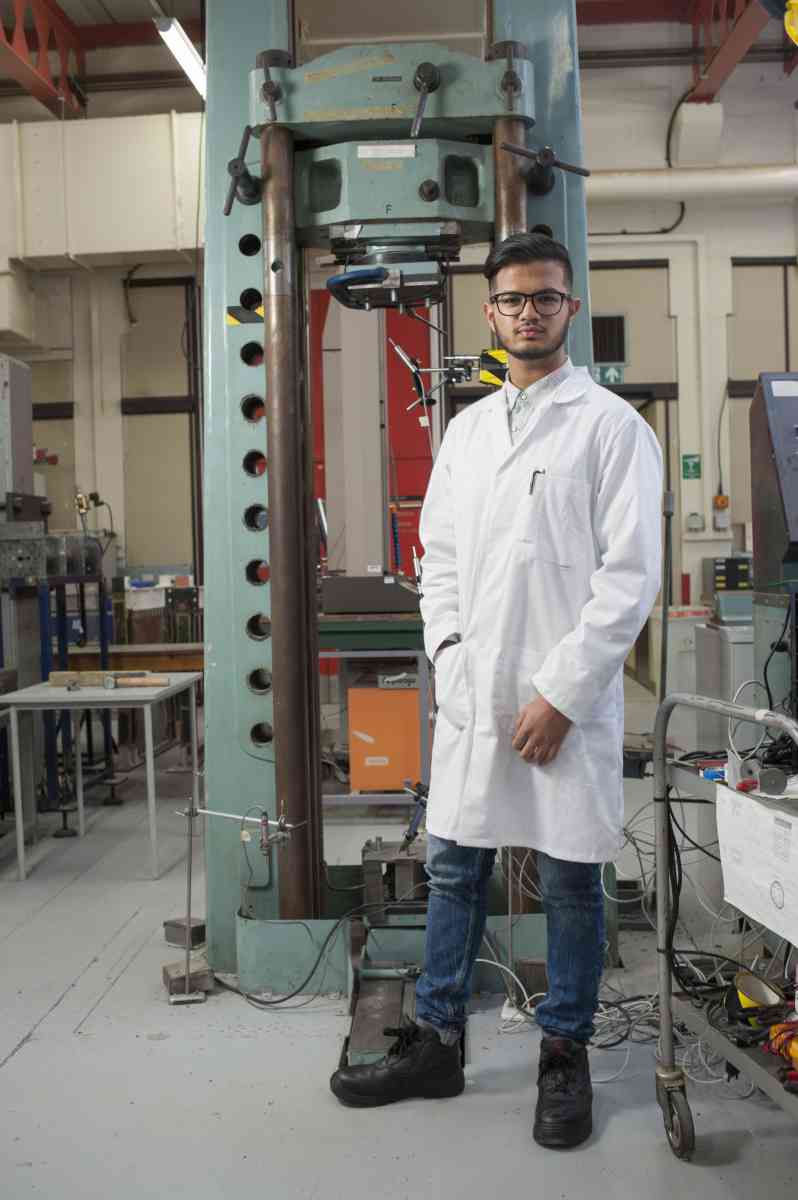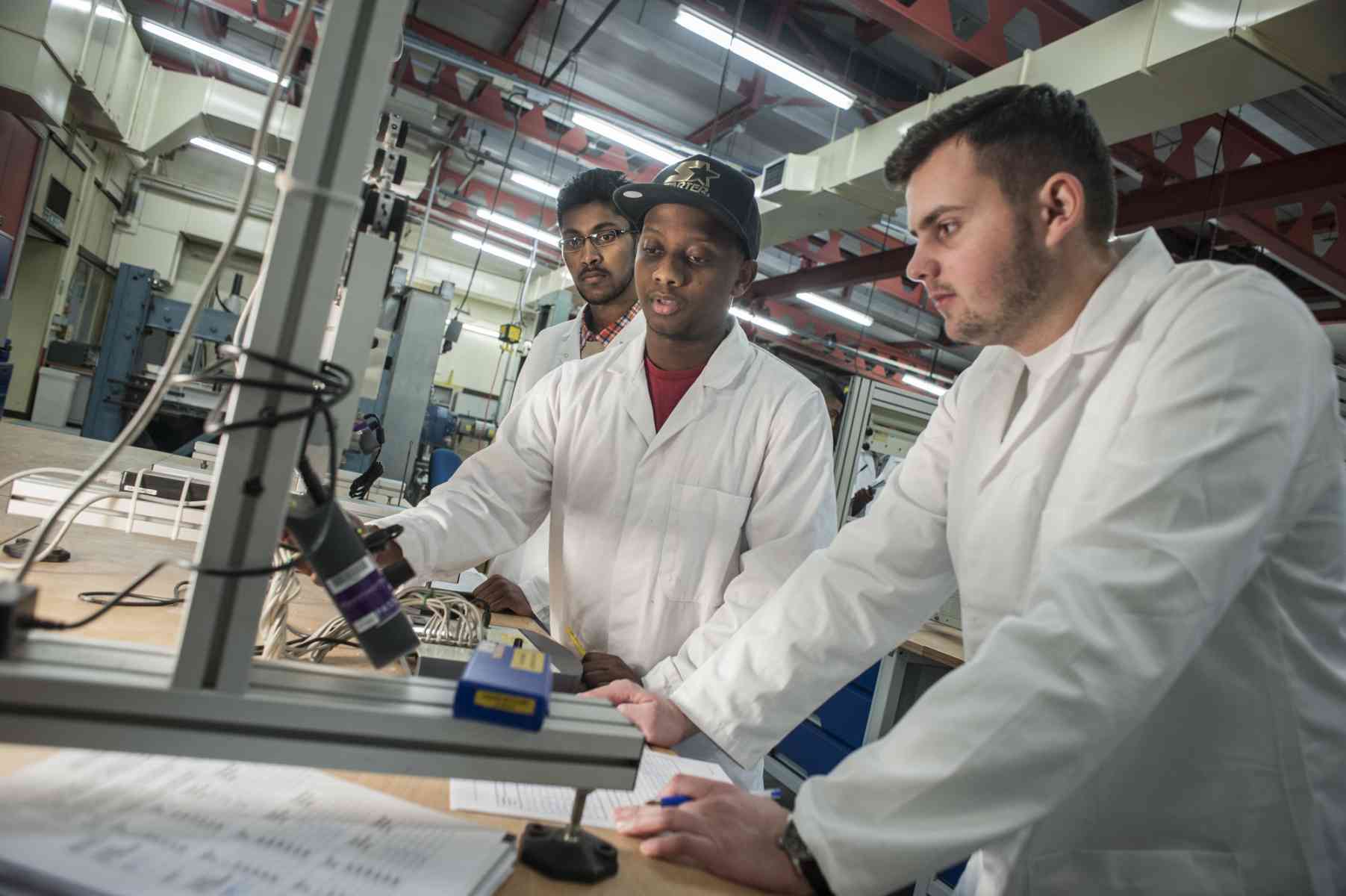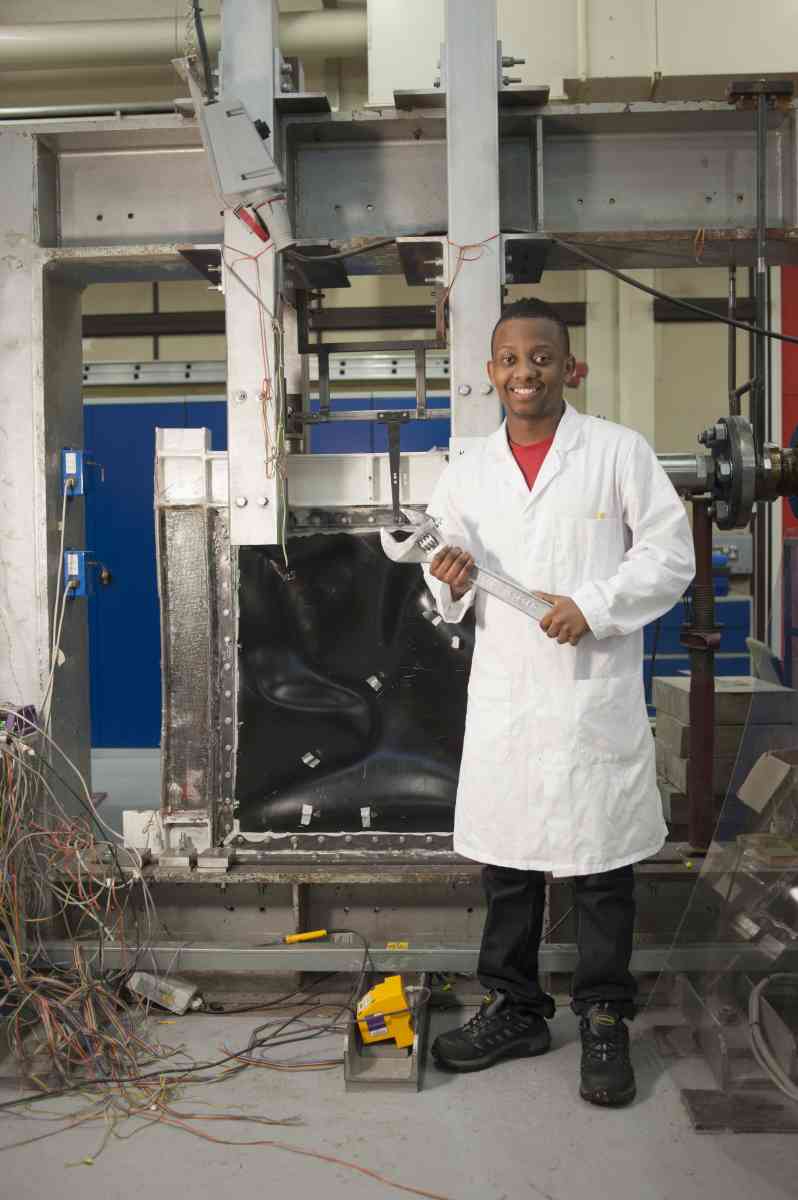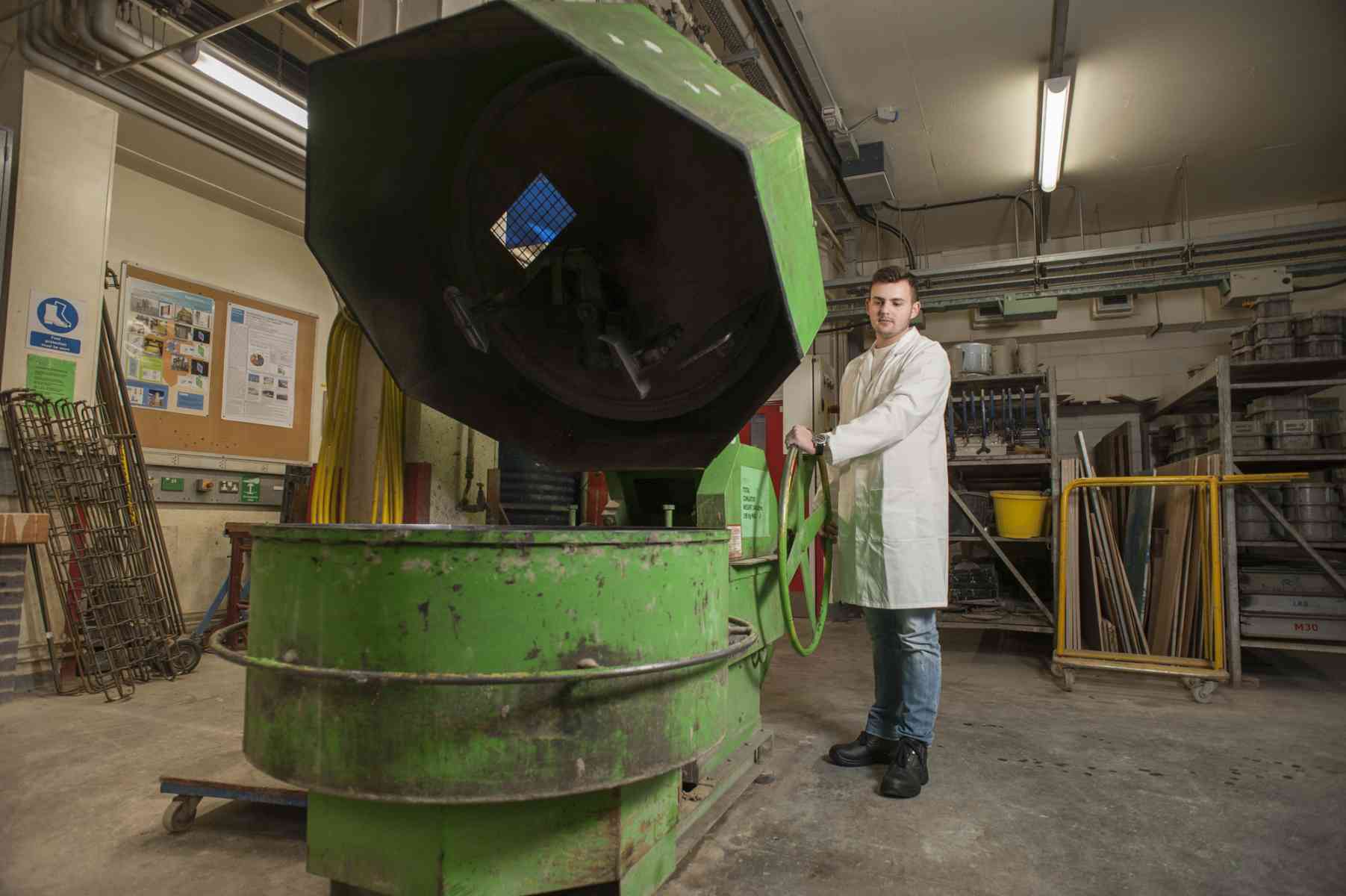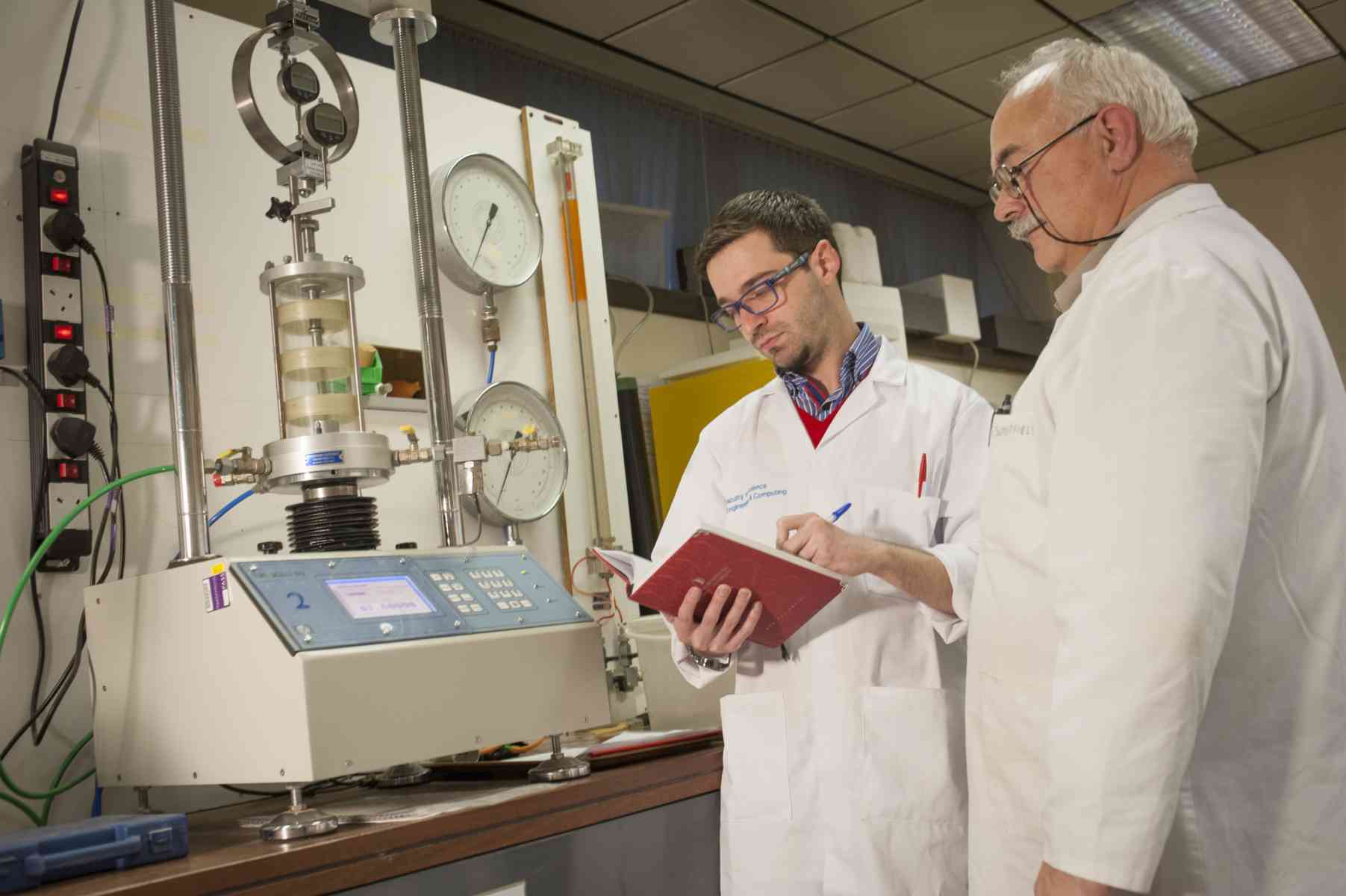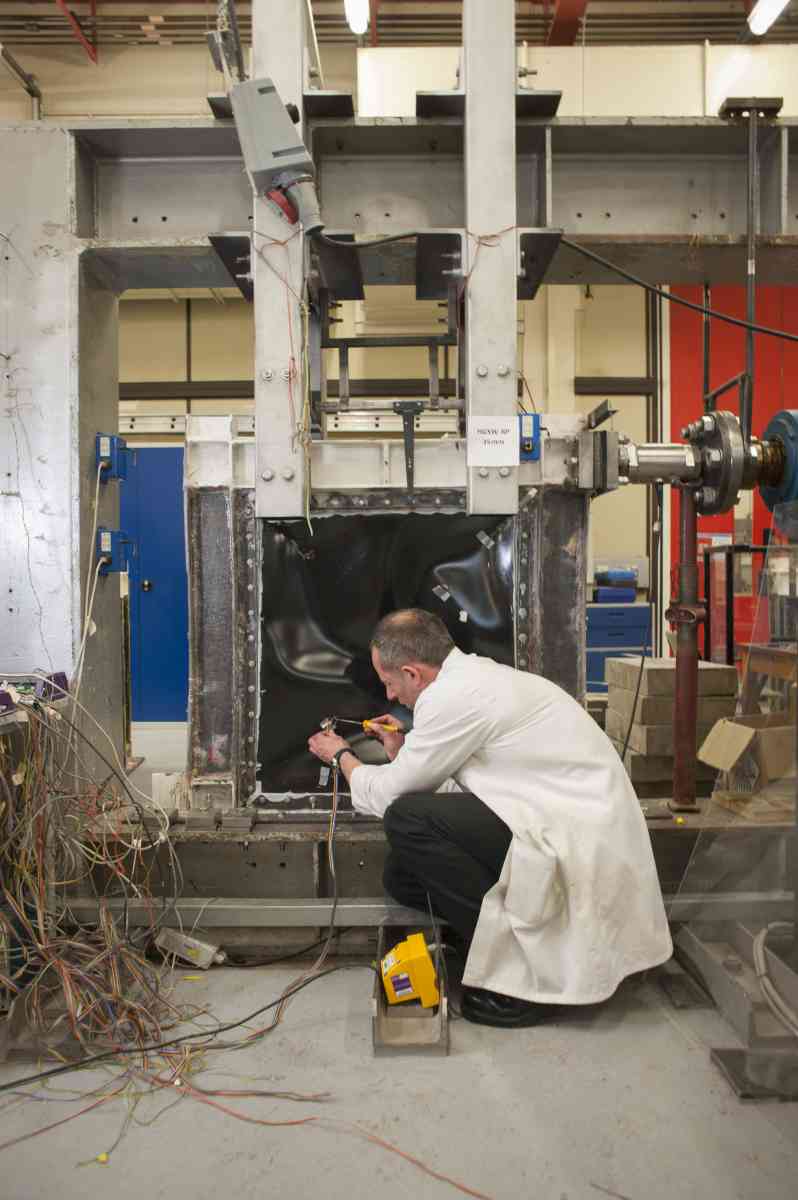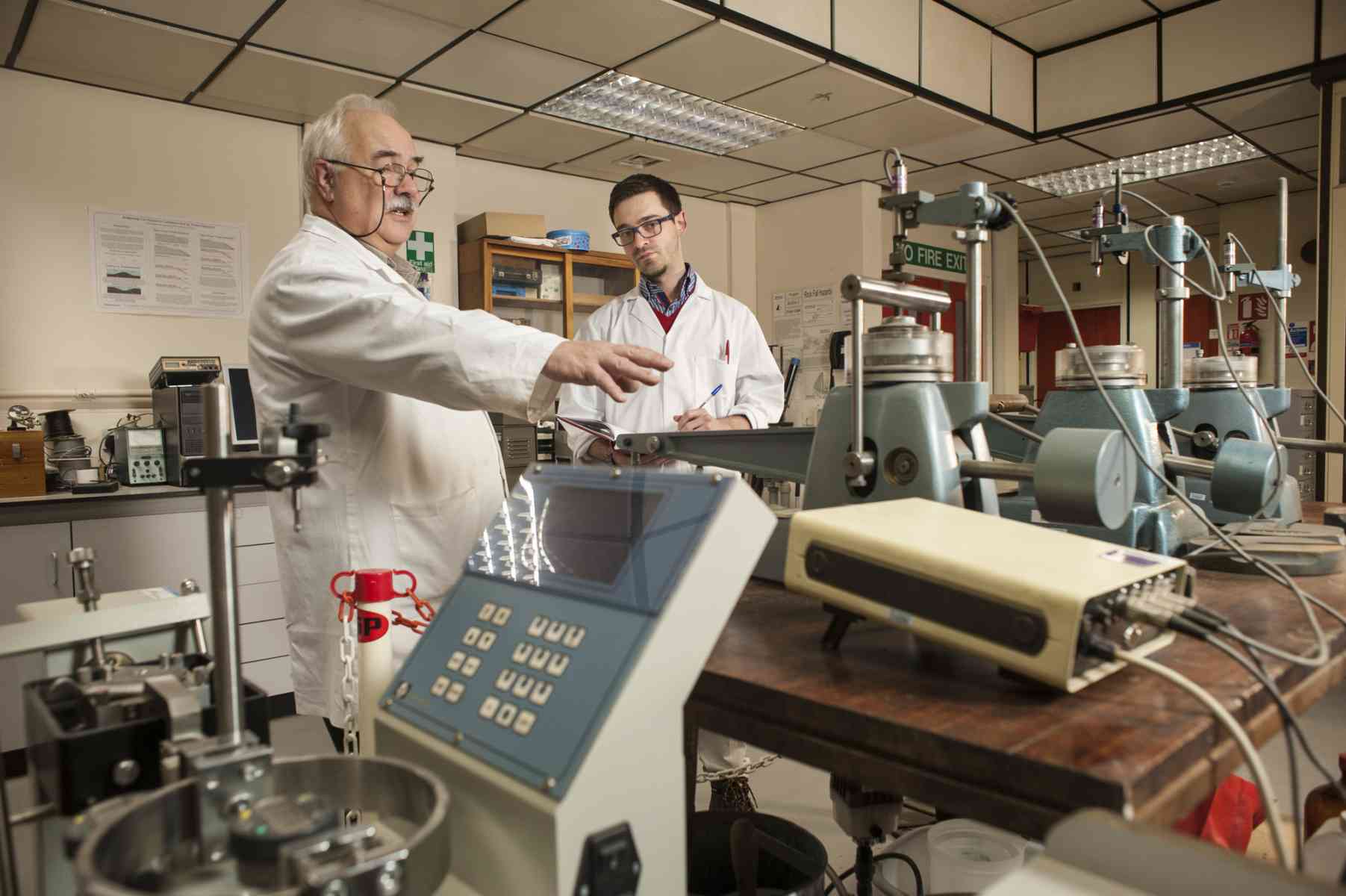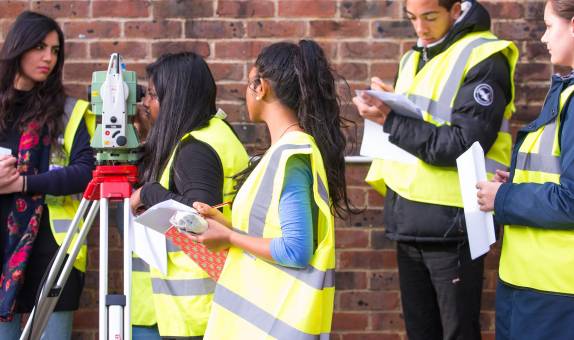Civil Engineering MEng (Hons)
Why choose this course?
Civil Engineers have to always keep pace with the developments around the world in order to meet the demands of a rapidly changing world, including respond to climate change emergency. This MEng Civil Engineering is designed to equip graduates with the underpinning knowledge, skills and professional behaviours expected from civil engineers to design, build and shape the world around them.
| Attendance | UCAS code | Year of entry |
|---|---|---|
| 4 years full time | H212 | 2024 (Clearing) 2025 |
| 5 years full time including professional placement | H213 | 2024 (Clearing) 2025 |
Please note: Teaching on this course may take place on more than one KU campus.
| Main Location | Penrhyn Road |
Reasons to choose Kingston University
- Combine engineering theory, design and use of structural design software with real-world case studies and hands-on experience through our specialist laboratory suites and on-site practical activities.
- Prepare for your future career with a year's paid work placement, or gain valuable experience by studying abroad.
- This degree fully satisfies the AHEP4 educational requirement for CEng – the professional recognition sought after by many engineers
What you will study
This course's modules provide the knowledge and skills required to adapt to climate change and the digital transformation of the industry. The modules will prepare you for industry practice, meeting relevant AHEP4 learning outcomes and requirements including the future skillset required (M1 – M18). The programme focusses on technical uncertainty, moving towards a problem and creative solution approach, all built around modern technology. This ensures "an emphasis on developing solutions to engineering problems using new or existing technologies, through innovation, creativity and change." (Engineering Council, 2020).
Year 1
Year 2
Year 3
Year 4
Core modules
Navigate for the Professional Engineer
15 credits
You'll be introduced to your course learning aims and consider your anticipated learning targets from induction to graduation. You'll be guided to identify and take ownership of your personal academic journey through the development and application of academic skills aligned to KU Graduate Attributes and their discipline-specific professional body learning outcomes. You'll be tutored in a range of 'learning to learn techniques, and you'll be introduced to assessment for learning and the role of feedback, reflection and feedforward as an integrated part of your learning journey. This will be supported through active engagement in the KU Navigate Programme enabling you to understand and begin to develop a design thinking approach to Future Skills development.
Mathematics and Engineering Analytics
15 credits
This module provides a thorough background in engineering mathematics and equips you with the mathematical skills essential for solving engineering problems. Topics covered include algebra, functions, logarithms, trigonometry, calculus, differential equations, and vectors. The context of the problems to be solved will include practical and real-life problems from a wide range of civil engineering examples to demonstrate the relevance of the various mathematical tools taught in the whole year.
Fluid and Soil Mechanics
30 credits
This module introduces the fundamental properties of fluids and soils, covering the basic equations used in fluid mechanics and the essential aspects of soil mechanics. It also includes the concept of dimensions and the SI units of measurement utilised in science and engineering.
Where possible, lectures will relate academic work to the ‘real world' of civil engineering, through the introduction of case studies and research. Theoretical topics are supported by laboratory practicals that also provide instruction in safe laboratory working practices, analysis of test data and appropriate reporting.
Structural Analysis and Design 1
30 credits
This module covers the fundamentals of structural analysis along with an introduction to stress analysis and design. You will study the behaviour of statically determinate structures, their properties and the effect of different types of static loading. The theoretical principles will be verified by laboratory testing under the Mechanics of Materials module. An analysis of trusses and simple structural elements will be developed qualitatively and quantitatively using numerical skills that are necessary for a thorough understanding of the behaviour of structures and structural systems.
Sustainability for Professional Practice
15 credits
This module will explore the environmental, economic, and social problems that society faces and encourages students to find and create sustainable innovative solutions. Students will be introduced to the complex societal problems and current time challenges associated with social justice, cultural inequalities, ethics, and climate change emergencies.
The students will be immersed in a culture of education that provides knowledge, values, attitudes and skills and encourage them to think about possible solutions seeking to balance economic, environmental, and social objectives set by the United Nations Sustainable Development Goals (UNSDGs) and the challenges in achieving those goals.
Introduction to Mechanics and Materials
15 credits
This module develops students' understanding of the fundamentals of structural characteristic and mechanics properties of a broad range of engineering materials including common civil engineering materials. This module introduces the fundamental concepts and engineering mechanics of the materials.
This module also enables the student to appreciate essential fundamental materials properties required to undertake practical approach to the solution of basic real-life engineering problems.
This module also promotes effective group working and leadership skills and develops skills in management of engineering design and creative problem-solving which are key employability and graduate skills.
Core modules
Hydraulics and Water Engineering
15 credits
This module considers natural river courses and the conveyance of water through pipelines, culverts and canals. Laboratory demonstrations and practical classes will enable you to experience key phenomena first hand. There may also be the opportunity for a field trip to further reinforce the learning of topics such as the basics of catchment characterisation and stream flow measurement. The module will introduce you to much of the work carried out by civil engineers employed in the water industry.
Digital Construction and Building Information Modelling (BIM)
15 credits
This module introduces the key principles of BIM, providing learners with an overview of the standards, management processes, legal implications, ethical context, collaborative working practices and software packages. It will also provide an understanding of digital technologies and construction-related information modelling in the built environment context.
Students will learn how digital construction has revolutionised the construction industry and how BIM and its closely related digital technologies are used as tools for the realisation of the construction industry 4.0. The module will address various aspects of digital design, construction, and operation and maintenance, including the knowledge and use of tools related to BIM, virtual reality, artificial intelligence, and geographic information system.
Geotechnics and Materials
30 credits
The geotechnics section of the module covers engineering geology, groundwater seepage; shear strength of soils, stresses in soils due to foundation loading, consolidation behaviour and settlement of soils. The materials section of the module develops understanding of properties of various engineering materials, enabling students to learn about material selection and application in construction, including sustainable practices used to reduce waste, promote recyclability, and assess impacts on the environment.
Structural Analysis and Engineering Design
30 credits
This module covers the fundamentals of structural analysis along with an introduction to stress analysis and design. You'll study the behaviour of statically determinate structures, their properties and the effect of different types of static loading. The theoretical principles will be verified by laboratory testing under the Mechanics of Materials module. An analysis of trusses and simple structural elements will be developed qualitatively and quantitatively using numerical skills that are necessary for a thorough understanding of the behaviour of structures and structural systems.
Exploring Engineering Project Management
15 credits
This module considers the principles and practices for the design and management of engineering projects. The nature of engineering project management is discussed in the context of constraints on quality, time, risk, and sustainability. The module broadens the student's knowledge of how organisations undertake and monitor projects.
Engineering Geodesy and GIS
15 credits
This module exposes you to the instrumentation and observation principles of modern engineering surveying and develops their theoretical understanding and relevant mathematical expertise as well as practical skills.
We will help you understand how engineering surveying can contribute to the successful design and completion of engineering projects through practical hands-on activities and in desktop calculation and software use. Basic operating principles of surveying equipment – focusing on the horizontal and vertical control using Theodolites, Levels and Total Stations – are covered in the module and supported by practical exercises.
During lectures, you will gain the required theoretical knowledge and concepts of surveying, as well as develop practical and mathematical surveying skills. Theoretical knowledge will then be enhanced by a range of fieldwork sessions using high-precision surveying instrumentation such as levels, theodolites, total stations and other geodesy equipment. We will take you from data collection, through to processing and analysis, to interpretation of results using appropriate computer software.
Core modules
Applied Business Management
15 credits
You will demonstrate the ability to apply your professional skills in your chosen area, and gain a broad understanding of the business environment in which professional activities are undertaken. The module will develop the technical, management and interpersonal skills required to perform in a team environment, and prepare you for employment and entrepreneurship.
You will participate in Kingston University's Bright Ideas competition where you will work as a team to develop a business idea. To do this you will need to interact with relevant stakeholders outside the University.
You will be guided to interact with professional and learning communities beyond the University and reflect on these interactions. This may include participation in co-curricular events such as subject-specific and career development events, and networking opportunities offered by subject-specific professional bodies. You'll leverage interactions with professionals in the development of your final year research project, and reflect on the co-benefits of these interactions.
Highway, Transport and Traffic Engineering
15 credits
This module has been designed to broaden the students' perspective on the infrastructure that underpins a developed society and the role of the civil engineer in its design, construction, maintenance and management. The requirement for sustainable solutions will be emphasised throughout the module, considering environmental, economic, social and political factors.
The delivery of the module will be reinforced by a number of computer lab sessions on the subject of highway design and traffic management. The module will consider a broad range of infrastructure with a focus on transportation, traffic and highway design, with the view to opening up career path opportunities for graduates.
Advanced Structural Modelling and Design
30 credits
This module covers advanced methods and techniques for structural analysis and design of complex statically indeterminate structures in steel, concrete and timber, Upon the completion of this module students will be able to produce competent and professional structural designs including calculations and detailed drawings that will stimulate students' interest in structural engineering and encourage them to use their creativity and imagination to develop sustainable structural solutions.
This module intends to develop students' structural design technical skills, to increase their awareness of the role of structural engineers in solving design and construction problems, to encourage students to utilise their membership of professional institutions and to enhance their employability.
Individual Research Project
30 credits
The individual project is an opportunity to explore a subject of your own choice and to initiate, design and execute a small-scale research project under supervision. The work in the project will draw upon material from all modules previously or currently taught and provide a culmination to your degree. Additionally, this allows you to develop and practice your research skills. You will be encouraged to work independently, study a topic in depth, review previous work, collect, and interpret and analyse information. This is also intended to develop your ability to communicate clearly and succinctly orally, graphically and in writing. In undertaking the work you should demonstrate knowledge and competence in reviewing literature and in using one or more of a range of research methods to collect and analyse data and draw well-founded conclusions. To support you, a series of workshops will be given along with individual one-to-one supervision to ensure that you are supported throughout the process.
Integrated Design Project
15 credits
You will be able to produce competent and professional designs that will be utilised in a group project. This will stimulate you to develop an interest and awareness of the scope and nature of civil engineering within the design process and to encourage creativity, engineering judgement and technical report writing. Development of team-working skills and independent study is an important part of the module. This module intends: to develop technical design skills, academic and communication skills, to increase awareness of the role of the civil engineer in planning, design and construction issues, to encourage you to utilise your membership of professional institutions, to appreciate effective team working and to enhance your employability.
Optional modules
Geotechnical and Environmental Engineering
15 credits
This module covers the analysis of stability of slopes, shallow and deep foundations, earth pressures and retaining walls, and ground improvement. The module incorporates design of various geotechnical structures according to current European Codes of Practice and relevant British Standards. Upon completion, students should be able to interpret geotechnical data from site investigation, use Eurocode 7 procedures to design earth slopes, spread footings, piled foundations, and retaining walls.
Geotechnical Engineering and Geophysical Hazards
15 credits
This optional module covers geotechnical engineering solutions to a variety of geophysical hazards, including earthquakes (shaking and liquefaction), volcanic eruptions, tsunamis and mass movements (landslides, falls and flows). Students will be skilled in interpreting site investigation data, using European Codes of Practice and relevant British Standards, to design shallow and deep foundations, earth pressures, retaining walls, earthquake-proof design of buildings and critical infrastructure, tsunami sea-walls and shelters, and engineering solutions to volcanic hazards.
Upon completion, students should be able to interpret geotechnical data from site investigation, use Eurocode 7 procedures to design spread footings, piled foundations, retaining walls and understand the variety of engineering solutions to geophysical hazards.
The module will also provide the students with an understanding of a variety of challenges posed by geophysical hazards and disasters. Students will consider the range of geophysical hazards, their processes, and the tectonic and geotechnical aspects underpinning these.
Through tailored fieldwork, students will learn how to assess and quantify level of risk associated with a number of primary and secondary hazards by identifying spatial distribution of hazards by location, and considering and measuring likelihood of events occurring, possible impacts and vulnerable "elements" and their value. Students will learn how to communicate this level of risk through risk mapping utilising GIS. Importantly, students will consider what mitigation is currently in place to lower the risk of hazards, and propose new engineering solutions to reduce the risk.
An appreciation of the wider topic of geophysical hazards, risk and how we mitigate them is important in terms of understanding the significance of geotechnical engineers in providing soft and hard engineering solutions to mitigate risk, thereby helping communities to build resilience to a variety of geophysical hazards. Cost benefit analysis and sustainability are key to discussions surrounding mitigation.
Geotechnical Engineering and Geomorphological Hazards
15 credits
This optional module covers geotechnical engineering solutions to a variety of geomorphological hazards, including coastal erosion, mass movements (landslides, falls and flows), subsidence and sinkholes. Students will be skilled in interpreting site investigation data, using European Codes of Practice and relevant British Standards, to design shallow and deep foundations, earth pressures, retaining walls and coastal defences. Upon completion, students should be able to interpret geotechnical data from site investigation, use Eurocode 7 procedures to design spread footings, piled foundations, retaining walls and coastal defences (e.g., groynes and sea-walls).
The module will also provide the students with an understanding of a variety of challenges posed by geomorphological hazards, in particular those occurring along coastlines, which, as a result of sea-level rise and more frequent and intense weather events (e.g., heavy rainfall and storm surges) related to climate change, are at increased risk of disasters.
Students will consider the variety of geomorphological hazards, their processes, and the geological and geotechnical aspects underpinning these. Through tailored fieldwork, students will learn how to assess and quantify level of risk associated with a number of these hazards by identifying potential hazards by location, and considering and measuring likelihood of events occurring, possible impacts and vulnerable 'elements' and their value. Students will learn how to communicate this level of risk through risk mapping utilising GIS. Importantly, students will consider what mitigation is currently in place to lower the risk of hazards, and propose new engineering solutions to reduce the risk.
An appreciation of the wider topic of geomorphological hazards, risk and how we mitigate these is important in terms of understanding the significance of geotechnical engineers in providing soft and hard engineering solutions to mitigate risk, thereby helping communities to build resilience and adapt to a variety of environmental hazards, including climate change. Cost benefit analysis and sustainability are key to discussions surrounding mitigation.
Core modules
Integrated Group Design Project
30 credits
This module provides a capstone element to the course by providing an opportunity for you to work on a major engineering design problem in a team in a way which closely parallels a real-world project. This module is where the knowledge gained in other modules is brought together to create and produce multidisciplinary solutions to civil engineering problems.
The module aims to develop your skills in design project management and planning. In order to successfully complete the module, you must establish a plan and work schedule, perform the technical tasks necessary to fulfil the plan, monitor progress, manage the team activities, hold and minute formal team design meetings, and resolve any problems that arise.
Management of Project Risk, Quality and Safety
30 credits
This module starts with a general introduction into the management of projects, and then goes more deeply into the technical aspects of project management techniques and project risk. Risk analysis and the identification and mitigation of risk events are dealt with in a construction project context, including human aspects. It covers many aspects of health and safety legislation and practice, starting from the history of health and safety in the UK, the Health and Safety at Work Act, risk assessment, and covers major sets of regulations that impact on construction work. The Construction (Design and Management) Regulations are dealt with in depth, as this is a key piece of statutory legislation that relates to the construction industry. Good practice and the importance of advice and guidance are emphasised. Quality management is dealt with in relation to the requirements of the latest edition of ISO9000, and the process leading to registration under this standard. Modern Practices in quality and the use of various quality management techniques are covered.
Digital Technologies and Construction Modelling
15 credits
This module provides an in-depth comprehension in utilising the Building Information Modelling (BIM) and Construction Information Management System (CIMS) in the construction industry. It covers various topics related to BIM and CIMS, including their current application, benefits, challenges in the industry sector, and future developments. The module will begin by recapping the fundamental concepts of BIM and CIMS, including the evolution of BIM and its importance in the construction industry. It will then delve into the different stages of BIM and CIMS, including modelling, collaboration, documentation, risk management, and collision avoidance and energy efficiency analysis. The module will cover various software tools that are commonly used in BIM and CIMS, such as Autodesk Revit, Navisworks, and BIM 360. In addition, you will learn how digital construction has revolutionised the construction industry and how BIM and its closely related digital technologies are employed as tools for the realisation of the Construction Industry 4.0. You'll undertake a collaborative interdisciplinary project to apply and develop your skills in a scenario-based group project. Finally, the course will discuss the future trends and developments in BIM and CIMS, such as the integration of Artificial Intelligence (AI), Machine Learning (ML), and Virtual Reality (VR) in construction.
Advanced Dynamic Analysis and Seismic Design
15 credits
This module covers the conceptual design, dynamic analysis, and detailed design of buildings subjected to earthquake induced actions. Although the buildings examined are concrete framed, the principles apply to other common construction materials.
Optional modules
Design of Concrete Structures
15 credits
This module covers the latest developments in material specification, structural design, and detail of concrete framed buildings. Methods of structural analysis and design in accordance with Eurocode 2 (EC2). Sustainability considerations are also integrated into the module and assessment.
Design of Steel Structures
15 credits
Steel structures are known for their strength, durability, and versatility. This module covers the latest developments in specification, design and detail of steel framed structures. Methods of analysis and structural design are in accordance with Eurocode 3 (EC3) for steel structures.
Legal Obligations and Regulatory Context
15 credits
This module provides you with an overview of the modern English legal system, with a specific focus on key legislative and regulatory frameworks. It is designed to equip you with comprehensive knowledge and insight into the key legal issues encompassing construction contracts. The module initiates an exploration into the realm of legal studies pertinent to the construction industry, encompassing distinct legal traditions, notably the common law, and sets the stage for a comprehensive examination of the law of obligations, including contract and tort law, and the principles of evidence primarily from a common law perspective, as well as, elements from civil law jurisdictions. You will develop proficiency in employing appropriate legal methodologies to address scenario-based legal problems. Throughout the course, you will acquire specialized legal skills and methodologies tailored to this discipline. This will empower you to cultivate analytical and critical approaches in applying the law of obligations and evidence, skills that are invaluable for construction professionals. You will acquire practical techniques for effective file and time management, as well as learn how to locate, interpret, utilise, and reference legal sources.
Administration of Construction Contracts (Contract Management NEC)
15 credits
This module focuses on equipping you with a comprehensive understanding of the intricate legal issues inherent in construction projects. Its purpose is to provide you with in-depth insights into the fundamental legal considerations associated with construction contracts. The module aims to enable you to critically analyse professional liability, assess strategies for expanding or constricting liability, and to appraise the scope of liability beyond the confines of contractual obligations. Furthermore, the module endeavours to provide you with a profound comprehension of matters pertaining to construction disputes, along with an exploration of the frequently employed methods for resolving such disputes.
Future Skills
Knowledge to give you the edge
Embedded within every course curriculum and throughout the whole Kingston experience, Future Skills will play a role in shaping you to become a future-proof graduate, providing you with the skills most valued by employers such as problem-solving, digital competency, and adaptability.
As you progress through your degree, you'll learn to navigate, explore and apply these graduate skills, learning to demonstrate and articulate to employers how future skills give you the edge.
At Kingston University, we're not just keeping up with change, we're creating it.

Entry requirements
If you would like to join us through Clearing 2024, please call our Clearing line on 0800 0483 334 (or +44 020 8328 1149 if you are calling from outside the UK) and speak to our friendly and knowledgeable hotliners who will be able to provide information on available courses and will guide you through your options.
Please note the entry requirements listed below are for 2025 entry only.
Teaching and assessment
Scheduled learning and teaching on this course includes timetabled activities including lectures, seminars and small group tutorials.
It may also include placements, project work, workshops, workshops in computer labs, and laboratory workshops.
Who teaches this course?
The majority of the course team are either active in engineering research or involved in industry-related professional activities, through KTPs or other direct involvement with industry. These activities played a major part in informing the course design and content, as did the direct input from industry through the activities of the Industrial Advisory Board.
At Kingston, research in the field of Civil Engineering has in recent years been concentrated in the areas of (i) structures and materials (concrete and sustainable materials) and (ii) geotechnical and hydraulic engineering science. Most of the teaching staff are also actively involved in the various Research Centres and/or Research Groups of the Faculty, or may be following interest areas of their own. These activities take them into, amongst other areas, advanced structural design, sustainable construction, composite materials, fire and blast resistance, earthquake engineering, geology and geotechnics.
Modules are mainly taught and managed by academic staff that are engaged in research in various areas and include their research findings in addition to well established principles.
The director for this course is Dr Nader Saleh-Matter who, along with all his academic colleagues, will be able to support your learning and teaching throughout the journey.
Facilities
There is a wide range of facilities for practical work at our Penrhyn Road campus, where this course is based. You will have access to a modern environment with the latest technology and industry-standard equipment, including:
- extensive materials and structures facility for concrete, masonry, steel and timber;
- geotechnical and hydraulics testing facilities; and
- surveying equipment, such as satellite global-positioning systems.
Dedicated computer-aided design facilities include:
- a range of CAD/CAM packages, such as Ideas, SolidWorks and AutoCAD;
- finite element analysis
- computational fluid dynamics; and
- virtual instrumentation.
Course fees and funding
Additional costs
Depending on the programme of study, there may be extra costs that are not covered by tuition fees which students will need to consider when planning their studies. Tuition fees cover the cost of your teaching, assessment and operating University facilities such as the library, access to shared IT equipment and other support services. Accommodation and living costs are not included in our fees.
Where a course has additional expenses, we make every effort to highlight them. These may include optional field trips, materials (e.g. art, design, engineering), security checks such as DBS, uniforms, specialist clothing or professional memberships.
After you graduate
You will graduate from this programme able to address the needs of society and business. You will be able to familiarise yourself with changes in digital technology, deploy engineering methods and technologies to create virtual models of your engineering designs, solve complex engineering challenges, work towards mitigating climate change impacts on infrastructure and society, and influence choices around carbon use and emissions across the sector.
Work placement year
How you can work in industry during your course
Placements:
- provide work experience that is relevant to your course and future career
- improve your chances of graduating with a higher-grade degree
- enhance your CV
- lead to a graduate job
- enable you to earn a year's salary whilst studying (the vast majority of placements are paid)
- help you to select your final-year project.
"To be successful, tomorrow's leaders will need to be far more rounded individuals than ever before. They will collaborate in pursuit of shared goals. They will guide, challenge and support...They will have an appetite for change and a hunger for continuous improvement, and they will have an ethos of learning and development..." Jeremy Darroch, Former Chief Executive, Sky.
"Doing a placement year effectively gives you one foot in the door of a future job and to stand out from the crowd... as well as enhancing my CV... and future interviews. It's a great motivator to be successful in my studies as it only serves to open even more doors and gain more skills." Placement student at Jagex Games Studios Ltd.
- 81% of placement students and 34% of non-placement students got a first or 2.1 (Faculty of Computing, Information Systems and Mathematics, 2008).
- 100% of placement students during 2008 recommend doing a placement (Faculty of Computing, Information Systems and Mathematics, 2008).
- Many employers offer a graduate job to their successful placement students.
There is a lot of support available for students looking to secure a placement (such as a jobs board with placement vacancies, help with writing CVs and mock interviews). Getting a placement and passing the placement year are ultimately the student's responsibility.
For further information please contact the placements team by telephone 020 8417 2969 or email secplace@kingston.ac.uk.
Examples of placements
Placements can be with large multinational companies, international companies, local companies and small start ups; offering a diverse range of posts. Here are some examples of employers and roles:
| Construction-based placement employers | Construction-based placement roles |
|---|---|
| RG Group Multiplex Costain Willmott Dixon Fluor |
Assistant site manager Assistant trades package manager Assistant logistics manager Health and safety officer Construction engineer |
| Science-based placement employers | Science-based placement roles |
| Reckitt and Benckiser GSK Drug Control Centre Minton Treharne and Davies Ltd Various local and international hospitals |
Bioanalytical sciences Lab assistant Pharmacy assistant Sports coach |
| Engineering-based placement employers | Engineering-based placement roles |
| Airbus BAM Nuttall Nissan Bosch Wozair |
Analysis of aircraft structure Construction resources specialist Site engineer assistant |
| Computing and IS-based placement employers | Computing and IS-based placement roles |
| Disney Sony Interactive Entertainment Europe IBM McKinsey Intel |
Database coordinator Software developer Website developer App developer |
| Mathematics-based placement employers | Mathematics-based placement roles |
| Lloyds Banking Group AXA Allianz PAU Education, Spain |
Analyst Investment solutions Research analyst Accounts assistant |
Key information set
The scrolling banner(s) below display some key factual data about this course (including different course combinations or delivery modes of this course where relevant).
Course changes and regulations
The information on this page reflects the currently intended course structure and module details. To improve your student experience and the quality of your degree, we may review and change the material information of this course. Course changes explained.
Programme Specifications for the course are published ahead of each academic year.
Regulations governing this course can be found on our website.




